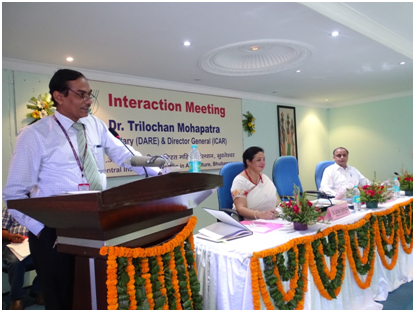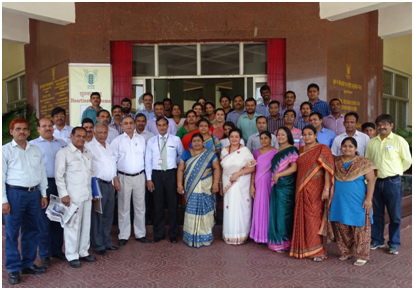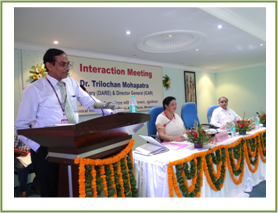Dr. Trilochan Mohapatra, Secretary (DARE) & Director General (ICAR) visits ICAR-CIWA on 24th April 2016Dr. Trilochan Mohapatra, Secretary (DARE) and Director General ICAR is visited ICAR-CIWA on April 24, 2016 for an interaction meeting with the Scientific, Technical and Administrative staff of the Institute. The meeting was attended by Dr. A.K. Singh, DDG (Ag. Ext.), Directors of various ICAR Institutes like, Dr. A.K. Nayak (ICAR-NRRI), Dr. J.M. Kataria (ICAR-CARI), Dr. Anupam K. Mishra (ICAR-ATARI, Jabalpur) besides officials of ICAR-NBPGR and all the staff of ICAR-CIWA. The interaction meet started with welcome address by Dr. Jatinder Kishtwaria, Director ICAR-CIWA who made a brief presentation of the ongoing activities and achievements of the Institute. She highlighted the achievements of the Institute since its inception and underlined the significant achievements like organization of the first Global Conference on women in Agriculture, flagging various issues related to women in agriculture, the linkages developed with various Institutions across the country, the close collaboration with the State government of Odisha on various aspects, besides the efforts being made to forge International linkages and reorienting the research directions to bring more visibility of the Institute nationally and globally. Dr. A.K. Singh, DDG (Ag. Ext.) in his address said that the Institute should focus more on the adaptation of the technologies to suit the local needs and develop tailor made packages in various sectors of agriculture for women. The Institute should also focus on the gender disaggregated data and equip itself to guide the policy decisions for State and the Central government. He said that the 642 KVKs across the country has close to 600 women scientists who can be linked with the activities of the Institute under project mode. |
|
Dr. Trilochan Mohapatra, Secretary (DARE) and Director General ICAR in his address said that ICAR-CIWA is the only Institute working in a focussed manner on issues of women in agriculture. There was a need to critically look into the mandate of the Institute because of significant position it holds in giving directions to the policy issues in the country related to women in agriculture. ICAR-CIWA being a small institute with limited staff should focus on the core issues and excel in its niche area. He said that there was need to clearly define the concept of women in agriculture (WIA) by not restricting it to address rural women only. The women in urban areas, being educated and having spare time can also significantly help in addressing the issues of household nutrition by promoting urban horticulture and roof top gardening to supplement their income and nutrition components. The issues of WIA need to broaden to encompass the post harvest and processing aspects besides the field activities being undertaken by them. It should also address the various issues related to strengthening the women's say in the value chain especially the marketing aspects. There was also a need to assess the involvement of various caste groups in the field work and what kind of activities were being undertaken by them. The DG also advised to look into the studies of NSSO and come out with a study on how women are engaged in agriculture across the country. He also stressed the Institute should work on validation of location specific technologies and link the KVKs for their wider adoption. The various policy issues like mobility of men and resulting impact on WIA being the managers of farm and families also need to be studied. The ownership of land, the handling of finance by women are some of the other issues that impact the outcomes of WIA. Dr. Mohapatra wished that the Institute should continue to do the good work it has initiated as this Institute is one of the flagship programmes of the Council because it has no equivalence in any other organizations like DST, DBT, CSIR etc. and they all look to this Institute for guidance and policy directions. The meeting ended with thanks to the dignitaries followed by discussions. Finally, the dignitaries planted the saplings in the campus with a wish that as the tree grows, so the Institute will shine in future.
|
 |
 |

